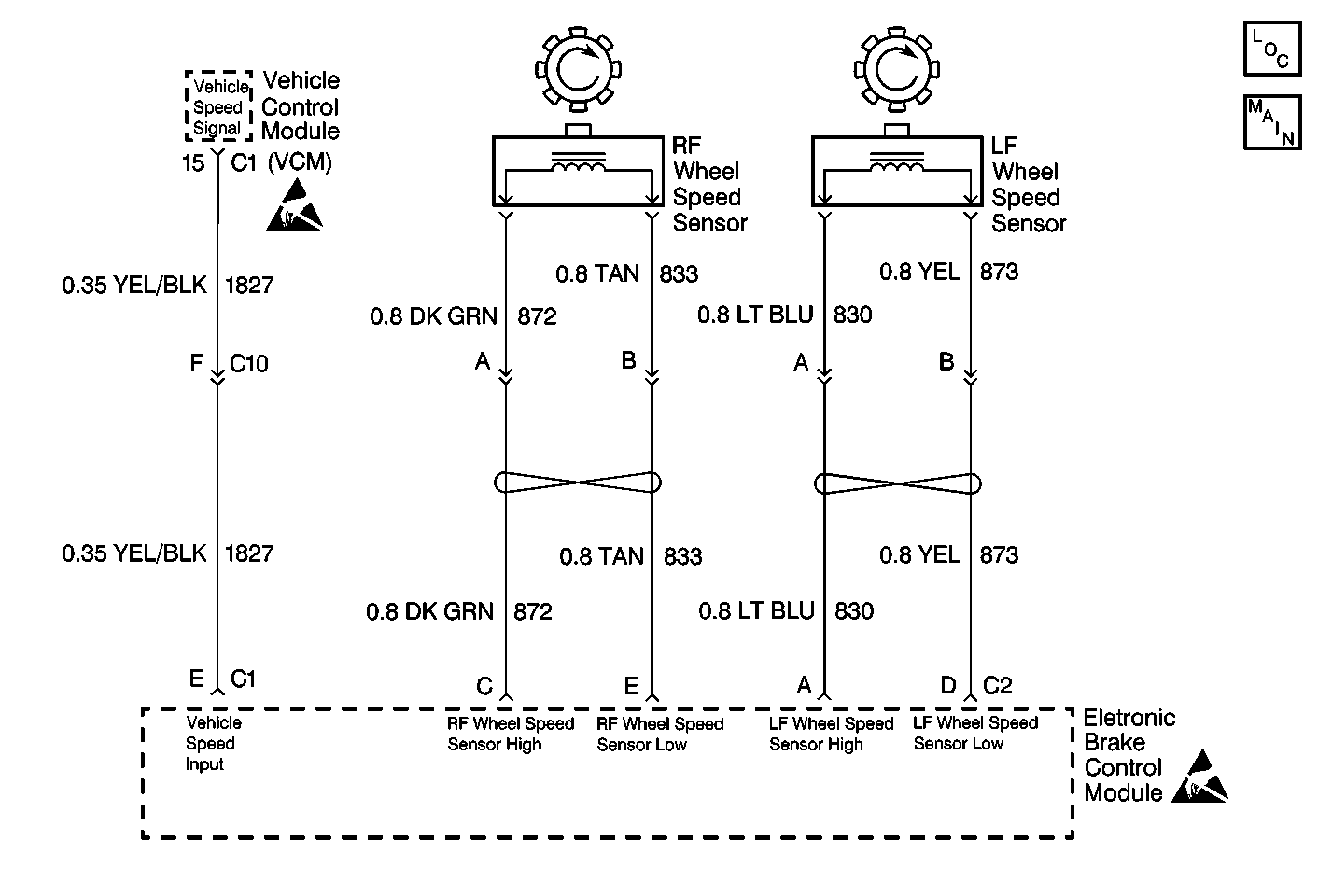
Circuit Description
As a toothed ring passes by the wheel speed sensor, changes in the electromagnetic field cause the wheel speed sensor to produce a sinusoidal (AC) voltage signal. The frequency and amplitude of the sinusoidal (AC) voltage signal are proportional to the wheel speed. The amplitude of the wheel speed signal is directly related to the distance between the wheel speed sensor coil and the toothed ring. This distance is referred to as the air gap. The EBCM can detect wheel speed signal malfunctions as they happen. An error in reported wheel speed can be compensated for by the EBCM up to a point. The error compensation will allow the EBCM to continue to function normally instead of setting a DTC. If the wheel speed mismatch increases beyond that point, the EBCM will set a DTC.
Conditions for Setting the DTC
| • | Any wheel speed differing from the vehicle speed by greater than 10%. |
| • | The vehicle speed is greater than 40 km/h (25 mph) |
| • | No unexpected wheel acceleration: anything that generates consistent differences between the wheel speed signals |
Action Taken When the DTC Sets
| • | The ABS indicator lamp turns on |
| • | The ABS disables |
DTC C0238 is an Ignition Latched DTC, which indicates the above actions remain true until the ignition is turned to OFF (even if the cause of the DTC is intermittent).
DTC C0238 is a DRP Critical DTC, which means that DRP is disabled and the BRAKE indicator lamp will also light.
Conditions for Clearing the DTC
| • | Repair the conditions responsible for setting the DTC. |
| • | Use the Scan Tool Clear DTCs function. |
| • | An Ignition Latched DTC will disable ABS and DRP during the course of the current ignition cycle, (even if the cause of the DTC is intermittent). The DTC will be stored in the EBCM memory until it is repaired, and/or the DTC is cleared. After the DTC is repaired and/or cleared and the ignition is turned to ON, the ABS lamp will remain lit until the EBCM completes a power-up self test. This test concludes when the vehicle has reached a speed of greater than 13 km/h (8 mph) and the wheel speed inputs have been checked by the EBCM. |
Diagnostic Aids
Installing significantly different tires on the vehicle usually sets a DTC C0238.
Step | Action | Value(s) | Yes | No |
|---|---|---|---|---|
1 | Was the Diagnostic System Check performed? | -- | Go to Step 2 | |
2 | Inspect the vehicle tires for a variation in tire size Are all four tire sizes the same? | -- | Go to Step 3 | Go to Diagnostic Aids |
3 |
Does the Scan Tool indicate a mismatch in wheel speeds? | -- | Go to Step 4 | Go to Step 8 |
4 | Does the scan tool indicate a mismatch with the right front wheel speed? | -- | Go to Step 5 | |
5 | Does the scan tool indicate a mismatch with the left front wheel speed? | -- | Go to Step 6 | |
6 | Does the scan tool indicate a mismatch with the rear wheel speed? | -- | Go to Step 7 | |
7 | Does DTC C0238 set as the current DTC? | -- | Go to Step 9 | Go to Step 8 |
8 | Malfunction is intermittent. Refer to Diagnostic Aids. Is the repair complete? | -- | -- | |
9 | Replace the Electronic Brake Control Module. Refer to Electronic Brake Control Module Replacement . Is the repair complete? | -- | -- |
